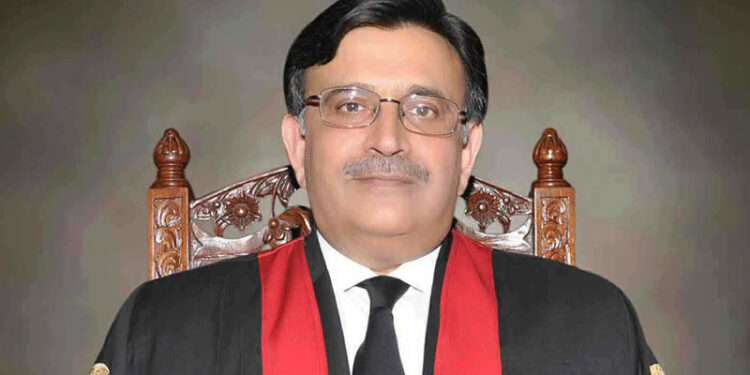Chief Justice of Pakistan Umar Ata Bandial on Tuesday instructed Attorney General for Pakistan to provide copies of Parliament proceedings regarding the Supreme Court (Practice and Procedure) Bill 2023, which curtails the powers of the top judge, to understand lawmakers’ concerns.
An eight-member larger bench of the apex court heard three pleas challenging the bill, which recently became an act of Parliament.
The bench comprised CJP Umar Ata Bandial, Justice Ijazul Ahsan, Justice Munib Akhtar, Justice Mazahar Ali Akbar Naqvi, Justice Muhammad Ali Mazhar, Justice Ayesha Malik, Justice Syed Hasan Azhar Rizvi, and Justice Shahid Waheed.
Barrister Salahuddin represented the PML-N, Farooq Naek appeared on behalf of the PPP, and Pasha appeared on behalf of the PBC.
The CJP defended Justice Naqvi against the Pakistan Bar Council’s request not to include the judge in the larger bench and observed that if the judges were not respected, then justice was not respected.
He clarified that it was the prerogative of CJP to form benches under the SC Rules 1980.
Pasha had requested the bench to form a full court minus a judge against whom complaints of misconduct were pending in the Supreme Judicial Council.
The CJP then referred to the Iftikhar Chaudhry case judgement wherein it was held that no judge can be stopped from judicial work on account of pending reference against him or her.
He maintained that complaints against judges, including the CJP himself, emerged from time to time as political matters had “polluted” the SC environment.
The CJP lamented that political entities did not want justice but favourable decisions, which is why they resorted to “pick and choose”.
He highlighted that all institutions were required to follow the instructions issued by the SC and rejected the PBC’s request for a full court.
Remarking on the SC orders to halt the SC bill, Justice Bandial stated that the court orders were of an “interim” nature and that democracy was a primary tenant of the country’s Constitution.
According to the CJP, a “free judiciary and Centre” were also salient aspects of the Constitution and the ongoing case affected the independence of the judiciary.
He continued that the SC expected serious arguments from the parties in the case, adding that the large bench would provide “excellent assistance”.
Justice Bandial also commented that the law was the first of its kind in Pakistan and impacted the third pillar of the state, adding that an independent judiciary was a main feature of the Constitution.
“It is, for the first time, claimed that a necessary element of the Constitution is violated through legislation,” he said.
The court sought comprehensive answers from all parties in the case on May 8, as well as the parliamentary records of the law and dialogue in the standing committee.
The apex court also dismissed the AGP’s plea for vacating the anticipatory injunction on the law. The CJP ordered an explanation for what the law was and why it was created.













